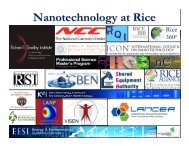Richard E. Smalley Institute for Nanoscale Science and - Center for ...
Richard E. Smalley Institute for Nanoscale Science and - Center for ...
Richard E. Smalley Institute for Nanoscale Science and - Center for ...
Create successful ePaper yourself
Turn your PDF publications into a flip-book with our unique Google optimized e-Paper software.
Rebecca <strong>Richard</strong>s-Kortum<br />
Rebekah Drezek<br />
Sibani Lisa Biswal<br />
16<br />
World Health<br />
Professor <strong>Richard</strong>s-Kortum focuses on<br />
translating research that integrates advances<br />
in nanotechnology <strong>and</strong> molecular<br />
imaging with microfabrication technologies<br />
to develop optical imaging systems<br />
that are inexpensive <strong>and</strong> provide point-ofcare<br />
diagnosis. When used with contrast<br />
agents, these rugged <strong>and</strong> portable optical<br />
imaging systems detect molecular signatures<br />
of precancer, assess tumor margins<br />
<strong>and</strong> monitor a patient’s response to therapy.<br />
Over the past few years, <strong>Richard</strong>s-<br />
Kortum <strong>and</strong> collaborators have translated<br />
these technologies from North America to<br />
both low- <strong>and</strong> medium-resource developing<br />
countries (Botswana, India, Taiwan,<br />
Mexico <strong>and</strong> Brazil).<br />
Professor Rebekah Drezek conducts basic,<br />
applied <strong>and</strong> translational research at<br />
the interface of photonics, medicine <strong>and</strong><br />
nanotechnology toward the development of<br />
cost-effective, optically based strategies <strong>for</strong><br />
screening, diagnosis <strong>and</strong> monitoring of cancer<br />
with particular emphasis on novel technologies<br />
to improve women’s health care.<br />
Recently Drezek was awarded a grant to<br />
combine the advantages of immunotherapy<br />
<strong>and</strong> light-activated photothermal therapy in<br />
the detection <strong>and</strong> treatment of cancer.<br />
Assistant Professor Sibani Lisa Biswal is<br />
working with MD Anderson Cancer <strong>Center</strong><br />
researchers to improve disease screening<br />
in patients through a new technology of<br />
programmable nanodroplet chemistry. This<br />
sensor technology detects the way proteins<br />
are folded to assess disease states.<br />
Using nanotechnology <strong>and</strong> microfluidics,<br />
this sensor offers a cost-effective way to<br />
test <strong>for</strong> a variety of variables quickly <strong>and</strong><br />
efficiently.






